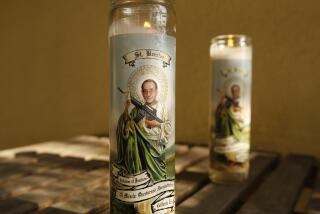Robert Boochever dies at 94; U.S. appellate judge
- Share via
Robert Boochever, a judge who honed his legal skills in the wilds of pre-statehood Alaska before his elevation to the U.S. 9th Circuit Court of Appeals, has died. He was 94.
Boochever died of natural causes at his home in Pasadena on Sunday, the court announced Tuesday.
He was one of 10 judges added to the powerful Western appeals court in the last years of President Carter’s term, the last significant expansion of the court that carries the largest caseload in the federal judiciary.
Some of Boochever’s most notable decisions involved interpretations of the Lanham Act and its preservation of a celebrity’s right to control the commercial value of his or her fame.
Boochever wrote a 2001 opinion overturning a $3-million award to Dustin Hoffman for a magazine’s unauthorized alteration and use of the famous movie still from “Tootsie” depicting the actor in a red sequined dress. The judge wrote that Los Angeles magazine and its parent company hadn’t acted with malice in doctoring the photo for a fashion spread.
In another case involving the right of publicity, Boochever wrote the 1992 opinion upholding more than $2 million in damages to singer Tom Waits in his suit against Frito-Lay Co. and advertising agency Tracy-Locke Inc. for the unauthorized use of his voice in a Doritos commercial.
Those who worked with Boochever described him as an even-tempered, fair-minded jurist who put as much energy into routine cases as those making headlines.
“He practiced judicial restraint but underpinned it with a sense of justice. He was a wonderful man,” said Laurie Taylor, a state appeals court attorney who spent 15 years as Boochever’s permanent law clerk. “His experience in Alaska made him a very independent thinker. He moved there when it was still a territory, practiced law and served as a U.S. attorney. He would tell these great stories about men in plaid wool jackets stabbing each other.”
Leo Tsao, a law clerk to Boochever in 1998-99, described him as “a great boss and as careful and as fair a judge as you could ask for.”
“He was very down to earth. You would never know he was such a giant of the legal community up there,” Tsao, now in private practice in Washington, D.C., said of the summer he spent with Boochever in Juneau, where the judge kept a home and they divided their time between fly fishing and weighing appellate arguments.
Born in New York City on Oct. 2, 1917, Boochever earned his undergraduate and law degrees at Cornell University. He moved to Alaska in the 1940s and worked in the U.S. attorney’s office in Juneau and in private practice before his 1972 appointment to the Alaska Supreme Court. He was chief justice for three years before his 1980 appointment by Carter to the 9th Circuit.
Boochever took senior status 25 years ago, a semi-retired state with a reduced caseload, but continued to serve on panels until about three years ago.
He is survived by four daughters and 11 grandchildren. His first wife, Connie, died in 1999 after 56 years of marriage. His second wife, Rose Marie Borden, died last year.
More to Read
Start your day right
Sign up for Essential California for the L.A. Times biggest news, features and recommendations in your inbox six days a week.
You may occasionally receive promotional content from the Los Angeles Times.





















































